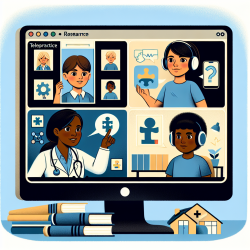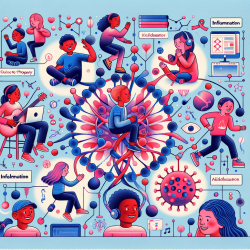Introduction
The COVID-19 pandemic has had a profound impact on various sectors, including healthcare and social services. The research article, "The Two Pandemics: the Disparate Impact of the COVID-19 Pandemic and the K-Shaped Recovery," provides valuable insights into how the pandemic has exacerbated existing disparities. As speech-language pathologists, understanding these disparities is crucial for improving service delivery and outcomes for children, especially those from vulnerable populations.
Key Findings of the Research
The study highlights the concept of a "K-shaped recovery," where different segments of the population recover at different rates. High-income individuals often experience a swift recovery, while low-income and minority groups continue to face significant challenges. This disparity is evident in access to services, education, and technology, which are critical for effective speech-language therapy.
Implications for Speech-Language Pathologists
Speech-language pathologists must consider these disparities when planning and delivering therapy services. Here are some actionable steps to improve outcomes for children:
- Leverage Technology: Utilize online platforms like TinyEYE to provide remote therapy services, ensuring that children from all backgrounds can access necessary support.
- Advocate for Resources: Work with schools and community organizations to secure resources that can bridge the digital divide, such as providing internet access and devices for families in need.
- Culturally Responsive Practices: Tailor therapy approaches to be culturally sensitive and relevant to the diverse backgrounds of the children served.
- Collaborate with Social Services: Partner with social service agencies to address broader socio-economic challenges that may impact a child's ability to engage in therapy.
Encouraging Further Research
The findings from this study underscore the importance of ongoing research to understand the long-term impacts of the pandemic on vulnerable populations. Speech-language pathologists are encouraged to contribute to this body of research by documenting their experiences and outcomes with diverse populations during the pandemic.
Conclusion
The COVID-19 pandemic has highlighted significant disparities in access to services, which can impact the effectiveness of speech-language therapy. By understanding and addressing these disparities, speech-language pathologists can play a critical role in supporting equitable recovery and improving outcomes for all children.
To read the original research paper, please follow this link: The Two Pandemics: the Disparate Impact of the COVID-19 Pandemic and the K-Shaped Recovery.










